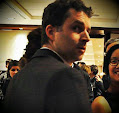Quantum computing milestones
The Wikipedia article on quantum computers has a nice short section with milestones in the history of the field.
Friday, November 29, 2002
Silicon qubit chip and Deutsch-Josza implementation
This article from NewScientist.com:
The first element of a device that many believe holds the best hope for quantum information processing has been completed by Australian researchers, while an Austrian team has reported the first truly quantum calculation. The achievements go some way to dispelling the widely-held idea that doing anything useful with quantum computing is decades or even centuries away.
This article from NewScientist.com:
The first element of a device that many believe holds the best hope for quantum information processing has been completed by Australian researchers, while an Austrian team has reported the first truly quantum calculation. The achievements go some way to dispelling the widely-held idea that doing anything useful with quantum computing is decades or even centuries away.
Petition to the APS to form a topical group on quantum information, concepts, and computing
Daniel Greenberger and Anton Zeilinger want to start a group on quantum information within the American Physical Society. It's a good thing, this is way overdue. Here's the announcement.
We are trying to start a topical group of the APS on quantum
information, concepts, and computation (QUICC). Those of us who work on
quantum information, including cryptography, and classifying entangled
states in varying ways, and quantum computation, and all sorts of
fundamental problems in quantum theory- measurement theory, superposition,
Bell Theorems, etc., have no natural home in the APS. They recognize only
such fields as Atomic, molecular, optical, high energy, condensed matter
physics, and a few others. Many of these are relevant for some of our
interests, but none are devoted specifically to our primary interests.
This move is at least 20 years overdue. Therefore we are petitioning
the APS to start such a group. We would appreciate the signatures of
everyone who works in these areas, and hope that everyone will publicize
this to their friends in the field. The whole petition, which spells
out the complete rationale, can be read and signed at the website:
http://www.sci.ccny.cuny.edu/~greenbgr/
or http://www.physics.umd.edu/robot.
Thank you very much.
Sincerely,
Daniel Greenberger, Dept. of Physics, CCNY
Anton Zeilinger, Director, Inst. of Experimental Physics, Univ. of Vienna
Daniel Greenberger and Anton Zeilinger want to start a group on quantum information within the American Physical Society. It's a good thing, this is way overdue. Here's the announcement.
We are trying to start a topical group of the APS on quantum
information, concepts, and computation (QUICC). Those of us who work on
quantum information, including cryptography, and classifying entangled
states in varying ways, and quantum computation, and all sorts of
fundamental problems in quantum theory- measurement theory, superposition,
Bell Theorems, etc., have no natural home in the APS. They recognize only
such fields as Atomic, molecular, optical, high energy, condensed matter
physics, and a few others. Many of these are relevant for some of our
interests, but none are devoted specifically to our primary interests.
This move is at least 20 years overdue. Therefore we are petitioning
the APS to start such a group. We would appreciate the signatures of
everyone who works in these areas, and hope that everyone will publicize
this to their friends in the field. The whole petition, which spells
out the complete rationale, can be read and signed at the website:
http://www.sci.ccny.cuny.edu/~greenbgr/
or http://www.physics.umd.edu/robot.
Thank you very much.
Sincerely,
Daniel Greenberger, Dept. of Physics, CCNY
Anton Zeilinger, Director, Inst. of Experimental Physics, Univ. of Vienna
Subscribe to:
Posts (Atom)
